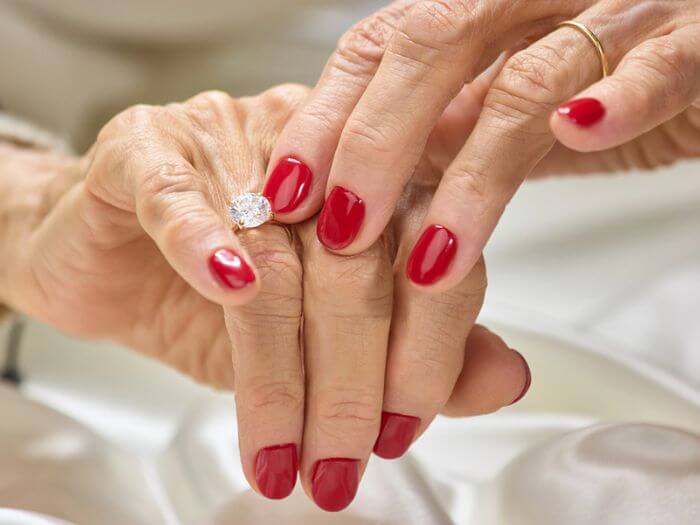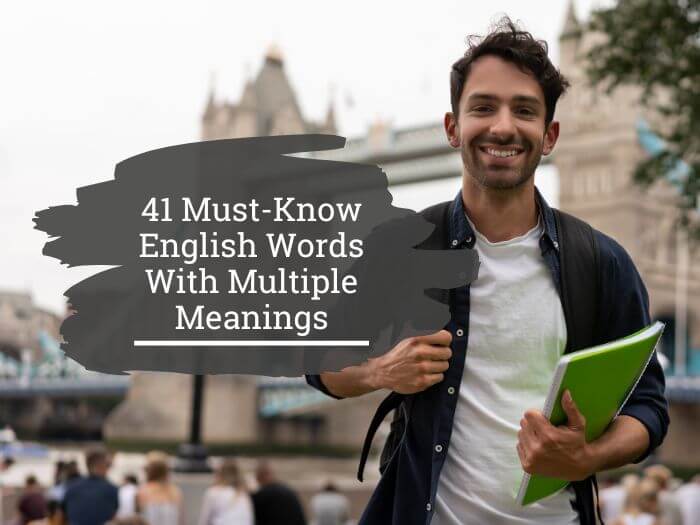There are thousands of English words with multiple meanings, also known as homonyms.
What exactly are these words?
Homonyms (from Greek homos ‘same’ + onoma ‘name’) are words that are spelt or pronounced the same but have different meanings.
“Can”” means “be able” (e.g. I can play the guitar) but also “to preserve food in a container” (e.g. We canned the tomato sauce so we’ll have some for the next winter).
“Train” is a means of transport but also that thing athletes do.
“Bat” is an animal but also a piece of wood baseball players use.
And so on.
Some say there are over 6,00 homonyms. But don’t worry, in this post we’ll look at the 41 most frequent English words with multiple meanings.
Let’s go!
Table of Contents
English Words With Multiple Meanings A-D
1 Arm

“Arm” can be a noun referring to a part of the human body (one of the two upper limbs).
- Example: I broke my arm playing volleyball.
But it can also be a verb that means to provide weapons in order to fight a battle or a war.
- Example: The knight was told to arm himself before the battle.
2 Add / Ad
“Add” is a verb meaning to combine or join something to increase its size, quantity, or effect.
- Example: Add more salt to the soup so your dad won’t complain!
But “ad” is also short for “advertisement” (a notice or announcement that promotes a product, job, or service.)
- Example: I saw a job ad and decided to apply.
3 Bark
Bark can be a noun meaning the outer layer of a tree.
- Example: Aspen tree bark makes a wonderful candle holder.
But it can also mean the sound that a dog makes.
- Example: The dog’s bark is different from the wolf’s bark.
It can also be used as a verb.
- Example: The dog kept barking all day!
4 Bowl
“Bowl” can be a noun meaning a deep, round dish used to hold food.
- Example: I had a bowl of fresh fruit for breakfast.
But it can also refer to the part of some objects that is like a bowl in shape.
- Example: A toilet bowl / the bowl of a spoon
Have you ever played bowling? I’m asking because “bowl” can be also be used as a verb meaning to roll the ball when playing that game.
- Example: It’s your turn to bowl. Please don’t let me down. Go!
5 Cast
“Cast” can mean “to look or smile in a particular direction”
- Example: He cast a smile in my direction.
It can also mean the group of actors in a play or movie.
- Example: All nine cast members were chosen before filming began.
It’s also that hard covering you have to wear on a breaken bone.
- Example: My dad had to wear a cast on his arm for six weeks!
6 Date
“Date” can be a noun meaning a day on the calendar.
- Example: What date is today?
It can also mean a romantic meeting with someone.
- Example: They went on a date to the new restaurant in town.
Or it can even refer to a tropical fruit.
- Example: Do you like dried dates?
7 Duck
“Duck” can be an animal.
- Example: Please don’t feed the ducks.
But it can also be used as a verb meaning to lower the head or body quickly.
- Example: We’re going to walk into the tunnel soon. Duck to avoid banging your head.
English Words With Multiple Meanings E-I

8 Ear
You have two ears (I hope).
- Example: When I was a child, my grandad used to pull my ears to make me laugh.
But an ear is also part of a cereal plant.
- Example: The farmer looked at each ear of corn to check it was ready for harvesting.
9 Fan
When it’s hot, you can turn on the air conditioning or a fan.
- Example: Please turn on the fan. I can’t even breathe!
Taylor Swift has millions of fans, too – except they’re humans.
- Example: I’m a huge fan of Iron Maiden! Taylor Swift? I don’t mind her.
Here’s another example taken from my book, 101 Conversations in Simple English: Short Natural Dialogues to Boost Your Confidence & Improve Your Spoken English
Alice: Are you a big fan of art, Mr. Windsor?
Lawrence Windsor: Yes, more than anything in the world. Art is my life. I love my collection, and now I’m upset because it’s incomplete.
10 Fall
Leaves fall during fall.
Fall = a verb meaning to move downward because of gravity.
Fall = the season between summer and winter (leaves usually fall in this period of the year).
I used the verb “fall” in a story I wrote in my book, Short Stories in English for Beginners: Read for pleasure at your level, expand your vocabulary and learn English the fun way!
This…
Sylvia thinks about her current situation. She goes back to the cabin. She sees the creature there. It chases her into the woods. She falls but then the creature helps her up. It is actually her father!
11 Grave
When you die (hopefully 100 years from now) you’ll be buried in a grave (unless you want to be cremated or you want your body to be disposed of in some other way)
- Example: I often visit my grandfather’s grave.
But “grave” can also be a formal adjective meaning “serious”.
- Example: I made the grave mistake of telling my grandmother I didn’t visit my grandad’s grave.
12 Head
If you’re able to read this, I’m 100% sure you have a head.
- Example: Nah, you don’t need one, do you?
Head can also be a verb meaning to lead or go in a particular direction.
Here’s an example taken from my book, Short Stories in English for Beginners: Read for pleasure at your level, expand your vocabulary and learn English the fun way!
I ask a woman on the street for a phone box. ‘There’s one,’ she says, pointing. ‘It’s just over there.’ I thank her and head for the phone box. But when I get there, I realize something.
“Head” can even be used to describe a leader or person in charge.
- Example: I work as the head of the marketing department.
13 Iron
“Iron” is a strong, hard metal.
- Example: I need new windows made of iron.
But when you wash your clothes, you can remove wrinkles from the fabric using a hot iron tool. That’s when you need “iron” as a verb.
- Example: I can’t even iron a sock!
14 Issue
“Issue” is another word for “problem”
An example from my book, Short Stories in English for Beginners.
Antonio has been really successful. He started as a sales associate. He always made his sales goals. So they brought him on the management team. Now he’s working on a big project. It’s supposed to involve a lot of money. The company’s money issues should soon be fixed.
But “issue” is also one of a regular series of magazines or newspapers.
- Example: The latest issue of The Time Magazine will be out in a couple of days.
English Words With Multiple Meanings J-M

15 Lie
When you lie, you put your body in horizontal position, normally because you want to rest.
I used this verb at the beginning of one of my stories from my book, 101 Conversations in Simple English.
Detective Smith handcuffs Robert Green, with his hands behind his back. She radios the police car and tells them to send an ambulance. Then, under the watchful gaze of Natalie, Alice and Pete, she opens the briefcase, which is lying on the ground. Inside are the Turner drawings!
But “lie” is also a verb that means “to say or write something that isn’t true”.
An example from Short Stories in English for Beginners: Read for pleasure at your level, expand your vocabulary and learn English the fun way!
‘What do you mean?’ asked Eric. He was looking at Carl suspiciously. Carl didn’t know what to say. He thought hard. Then he continued. ‘I think I know how it works,’ he lied.
You can “lie” in bed, of course, but your partner won’t be happy.
Regardless of whichever meaning you want to use for the word, make sure you never lie in court!
16 Lap
When you sit on a couch, you can put your hands on your lap (the top part of your legs). You can also put a laptop on it (that’s why a laptop is called that way).
- Example: The cat curled up comfortably on my lap.
But a lap can also mean a journey from the beginning to the end of a track used for running or racing.
- Example: Valentino Rossi was overtaken on the final lap.
17 Match
A match is a contest or game between two people or teams.
- Example: The soccer match ended in a draw.
It can also mean a small stick used to light fires.
- Example: Here’s a match to light the candle.
Or it can also be used as a verb meaning to pair something compatible or similar.
- Example: Your shoes match your dress perfectly!
I used it as a noun in one of my stories:
The old man tells me his story. ‘I have a son, but I have never met him. His mother and I were together many years ago. We weren’t really a perfect match. But I loved her.
(match = a person or thing that combines well with somebody/something else)
18 Mint
“Mint” is a herb often used in cooking.
- Example: I’d like some mint tea, please.
But did you know it’s also the place where coins and notes are produced?
- Example: The first season of Money Heist takes place in the Royal Mint of Spain in Madrid.
English Words With Multiple Meanings N-R

19 Nail
A nail is a thin, pointed metal pin used in construction.
- Example: Used a hammer to drive that nail into the wall.
But you have nails on your hands, too.
- Example: She painted her nails red for the ceremony.
And it can also be used as a verb meaning to successfully complete or achieve something.
- Example: You nailed the exam! Well done!
20 Net
A net is an object we use for catching fish or other things.
- Example: A shark was caught in the net.
But it can also refer to the total amount left after deductions or taxes (the opposite is “gross”).
- Example: My net earnings increased after his promotion.
21 Organ
An organ can be a musical instrument with keyboards and pipes. You often find this in churches.
- Example: He plays the organ.
Your stomach, liver, and heart are organs, too.
- Example: The heart is an essential organ in the human body.
22 Park
Central Park and Hyde Park are famous … parks! (= public outdoor area where people can relax and enjoy nature.)
An example from Short Stories in English for Beginners:
Walter arrived at The Meadows. It was a very large park in Edinburgh. It was full of people. Walter approached a young man.
But you can also park your car in a car park.
Another example from Short Stories in English for Beginners:
Laura arrives in Edinburgh. She parks near Princes Street. She walks throughout the city. No one sees her. She can’t believe it. She laughs quietly. ‘This really is amazing!’
23 Pitch
“Pitch” can be a noun meaning the level or frequency of a sound.
- Example: Lady Gaga hit a high pitch during the song.
It can also mean an area or field where you play soccer or cricket.
- Example: Real Madrid gathered on the pitch for the big game.
24 Quail
A quail is a small bird. Its eggs and meat are used in several (non-vegan) recipes.
- Example: I’ll have the quail eggs, thanks!
But “quail” can also be used as a verb meaning to feel or show fear.
- Example: The presenter began to quail at the thought of speaking in front of a large audience.
It’s unlikely that a quail will ever make you quail.
25 Punch
Close your hand and look at it. That’s called a “fist” (a hand when it’s tightly closed with the fingers bent into the palm). If you hit someone or something with your fist, what you’re doing is throwing a punch.
Do you know who Mike Tyson is? He was able to throw quite some heavy punches! Nobody wanted to mess up with him because of this.
- Example: She gave him a strong punch in the face!
But a punch can also mean a fruity, often spiked drink served at parties.
- Example: I’m going to make a large bowl of punch for the guests.
A punch is also a tool or machine for cutting holes in paper, leather, or metal.
- Example: Could you pass me the hole punch, please?
26 Ring
“Ring” can really mean many things.
It can be a round object you wear on your fingers. I used this word in my book, Short Stories in English for Beginners: Read for pleasure at your level, expand your vocabulary and learn English the fun way!
Here’s the passage from one of the stories:
‘Well?’ Alan said. ‘You wanted to talk to me?’ Walter started speaking. But then he noticed something. Alan was wearing a ring. There was a number on the ring. Walter began to laugh.
It can be the sound made by a bell or phone.
- Example: Did you hear the ring of the doorbell?
It can also be used as a verb meaning to make a phone call.
- Example: I’ll ring you tonight as soon as I get home.
27 Rose
A “rose” is a flower.
- Example: Here’s a red rose for you. I love you!
But it can also be the past tense of the verb “rise,” which means to move upwards. I used this in one of my stories from Short Stories in English for Beginners: Read for pleasure at your level, expand your vocabulary and learn English the fun way!
Here it is.
The men rose with the sun. They ate some of the supplies left from the journey. They also had meat from the hunt.
English Words With Multiple Meanings S-V

28 Sink
“Sink” can be a basin with a drain (the one you have in your kitchen and bathroom).
- Example: Go wash your hands in the sink.
But it can also be a verb that means “to go down towards the bottom of a liquid”.
- Example: The Titanic began to sink after hitting an iceberg.
29 Spring
Spring is the season following winter.
- Example: Flowers begin to blossom in spring.
It’s also a natural source of water that flows from the ground.
- Example: Finally, they found a freshwater spring in the forest.
A verb meaning to move or jump suddenly and energetically.
- Example: I felt so happy that I wanted to spring into the air.
And it’s a twisted piece of wire, too.
- Example: I have a bad backache. I think the springs in my mattress have gone.
30 Tap
A “tap” is a thing you use for controlling the flow of liquid in your sink.
- Example: You're wasting so much water! Turn off the tap, will you?
It’s also a verb meaning to touch lightly or repeatedly.
- Example: Tap on the “BUY” button on your smartphone to make the payment.
“To tap” also means to access or make use of something.
- Example: The company decided to tap into new markets overseas.
31 Tie
A “tie” is an item of clothing that men usually wear in formal situations.
- Example: I wore a red tie to the business meeting. Nobody liked it!
But “tie” can also be used as a verb meaning to fasten or attach things together.
- Example: Do you want to fall over? No. So tie your shoelaces, please.
I used this meaning of “tie” (figuratively) in the introduction of my book, 101 Conversations in Simple English: Short Natural Dialogues to Boost Your Confidence & Improve Your Spoken English.
This is the passage.
If you’ve ever tried speaking English with a stranger, chances are it wasn’t easy! You might have felt tongue-tied when you tried to recall words or verb conjugations.
32 Utter
“Utter” is a formal verb meaning to say something aloud.
- Example: I was too shocked to utter a single word.
It can also be an adjective to emphasise how complete or absolute something is.
- Example: The project was an utter waste of time!
33 Volume
“Volume” is the amount of sound that is produced by a television, radio, etc. or the amount of something in general.
- Example: Turn up the volume, please. I can’t hear anything!
I included this word in my book – Short Stories in English for Beginners: Read for pleasure at your level, expand your vocabulary and learn English the fun way! – to give you a tip about reading.
Here it is.
The more you read, the more you learn. By reading longer texts for enjoyment, you will quickly build up an understanding of how English works. But remember: in order to take full advantage of the benefits of extensive reading, you have to actually read a large enough volume in the first place.
A volume is also a formal word meaning “book” or one part of a series of books.
- Example: The library has more than 100,000 volumes.
English Words With Multiple Meanings W-Z

34. Watch
A Rolex is a watch.
But it’s also a verb meaning to observe or look at something carefully.
- Example: Watch me while I’m watching my watch.
This is an improbable example. Here’s how I used both meanings of “watch” in my stories.
Natalie and Alice arrive at Camden Market.
Alice: Wow! Look at all this stuff Natalie.
Natalie: It’s amazing! There are so many shops, and loads of people.
Alice: Look at this watch! Is it an antique?
Natalie: Yes, it looks very old.
From 101 Conversations in Simple English: Short Natural Dialogues to Boost Your Confidence & Improve Your Spoken English
And here’s the second meaning in another chapter of the story.
Alice: Hello! I have a few questions about yesterday, if that’s not a problem.
Daniel: Sure. That’s not a problem.
Alice: To start, did anything strange happen yesterday?
Daniel: I don’t remember anything strange. I was watching the cameras all day. No one strange is seen entering the house in the video footage.
35 Well
“Well” can be an adverb meaning “in a good / proper way”
An example from my book (101 Conversations in Simple English: Short Natural Dialogues to Boost Your Confidence & Improve Your Spoken English):
Alice: How long has he been working here, exactly?
Lawrence Windsor: He has been working here for six months. He is an excellent gardener. He looks after the plants very well. He loves his job.
A well is also a deep hole in the ground used to get water.
- Example: The villagers drew water from the well each morning.
36 Wind
“Wind” is a natural movement of air in the atmosphere.
An example from my book (Short Stories in English for Beginners):
It’s June and it’s really hot. But there is a nice wind to cool us.
“Wind” – pronounced as “waind” /waind/ is also the act of turning, wrapping or twisting something around itself or in a circle.
- Example: I’ll have to give the old clock a wind every night.
37 Yard
“Yard” – in American English – is an area of land next to or around a house. It’s often used as a garden or outdoor space.
- Example: The children played in the yard all afternoon.
It can also mean a unit of measurement for measuring how long something is (in length). It’s equal to 3 feet (36 inches) or 0.9144 of a metre.
- Example: In Britain and the USA people measure length in yards rather than meters.
38 Wave
You’ll see plenty of waves when you go to the sea.
- Example: The surfer caught a big wave.
But if you wave at somebody, you move your hand back and forth as a greeting or signal.
Lifesaver tip: If you’re drowning because of a big wave, try to wave at the lifeguard!
- Example: I waved at her friend from across the street.
39 Zip
A “zip” is a thing that you use to fasten clothes, bags, etc.
- Example: Pull up your zip. It’s too cold out here.
“To zip” is also used informally meaning “to move quickly or with high energy.”
- Example: He zipped through the crowd to catch his train.
40 Zest
“Zest” is the outer peel of citrus fruits, which is often used to add flavor to food.
- Example: Add lemon zest to the cake. It’ll taste yummy!
“Zest” can also mean great enthusiasm or energy.
- Example: The athlete tackled every challenge with zest and determination.
41 Zap
“Zap” is an informal term that means to destroy, hit, or damage something suddenly and with force.
- Example: The city was zapped by the hurricane.
You can use a remote control to change channels quickly. In other words, you can zap!
- Example: He kept zapping unable to decide what to watch.
FAQ About English Words With Multiple Meanings
What Are 10 Multiple Meaning Words?
1. Bat – An animal or a piece of sports equipment.
2. Bank – A financial institution or the side of a river.
3. Light – Not heavy or illumination.
4. Spring – A season or a coiled object.
5. Bear – A large animal or to carry/support.
6. Match – A game or a small stick to start a fire.
7. Right – Correct or the opposite of left.
8. Well – In good health or a water source.
9. Kind – Type or being considerate.
10. Rock – A stone or a genre of music.
What Words Have Multiple Meanings In English?
Many common words have multiple meanings, such as “run”, “set”, “date”, and “fast”. These words can change meaning depending on the context, making them versatile and complex.
What Word Has 645 Meanings?
The word “set” holds the record for the most meanings in English, with 645 definitions listed in the Oxford English Dictionary.
What Are Words With Multiple Meanings Called?
Words with multiple meanings are called homonyms if they sound or look alike but have different meanings, or polysemous words when a single word has multiple related meanings.
English Words With Multiple Meanings
Thanks for reading another one of my English guides.
As you’ve seen, English is full of homonyms, which can make learning the language feel a bit tricky at times. But don’t worry—there’s no need to memorise all of them!
Instead, focus on understanding English words with multiple meanings in context. Did you notice how many of them I used in my stories and books?
That’s what the StoryLearning method is all about. It helps you to learn English by immersing you in stories where homonyms appear in context.
You’ll encounter these English words with multiple meanings over and over again naturally as you read books for English learners (or English magazines or blogs to learn English or even comics in English.)
That's why reading will help you use English homonyms confidently in your own speaking and writing.
Let short stories in English guide your learning!

Olly Richards
Creator of the StoryLearning® Method
Olly Richards is a renowned polyglot and language learning expert with over 15 years of experience teaching millions through his innovative StoryLearning® method. He is the creator of StoryLearning, one of the world's largest language learning blogs with 500,000+ monthly readers.
Olly has authored 30+ language learning books and courses, including the bestselling "Short Stories" series published by Teach Yourself.
When not developing new teaching methods, Richards practices what he preaches—he speaks 8 languages fluently and continues learning new ones through his own methodology.










































